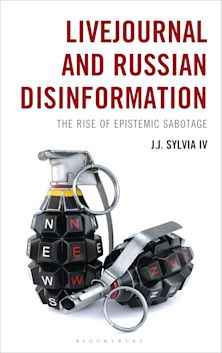Conspiracy Theories and Extremism in New Times
Conspiracy Theories and Extremism in New Times
This product is usually dispatched within 1 week
- Delivery and returns info
-
Free US delivery on orders $35 or over
Description
Conspiracy Theories and Extremism in New Times outlines a cadre of alt-right groups, conspiracy theories, and other forms of stigmatized knowledge threatening our society. In an era dominated by the pervasive influence of social media, the scholarly gaze has often overlooked the ways far-right factions leverage these platforms to propagate anti-democratic ideologies. From the denial of the moon landing to the enigmatic labyrinth of QAnon, and a myriad of other alt-right groups in between, this anthology presents a compelling case for the continued relevancy of the Frankfurt School of Critical Social Theory. Uncover the intricate web connecting these ideologies to everyday life, and arm yourself with the critical insights needed to navigate the turbulent currents of our modern socio-political landscape.
Table of Contents
Acknowledgments
Introduction:
Christpher T. Conner, Matthew N. Hannah, Nicholas J. MacMurray
1. Confirmed Conspiracy Theories in Contemporary Society
Robert Parker
2. Screaming Specks of Dust: Emotion and the Moon Landing Conspiracy Theory
Matthew Hayes
3. “I don’t need proof.” Atlantis, Aryans, and the use of Pseudoarchaeology by the Far-Right.
Stephanie Halmhofer
4. Reactionary Technopolitics: A Critical Sociohistorical Review
Sean Doody
5. A Prelude to Insurrection: How a 4chan Refrain Anticipated the Capitol Riot
Marc Tuters
6. White Supremacy, Right-Wing Extremism, and Conspiracy: Old Ideas, New Expressions
Lisa K. Waldner
7. America First is Inevitable: The Triumphalist Rhetoric of Nicholas Fuentes
Reed Van Schenck
8. Replacement Theory on the Road to Conspiracy
Michael Barkun
9. Conspiracies and Sadistic Freedom
George Lundskow
10. QAnon as A Contemporary Reemergence of the Satanic Panic
Katherine Fitzgerald
11. Mass Culture or Fascist Propaganda? Using Adorno to Understand QAnon’s Reliance on Movie References
Liv Agar
12. Memes, The Matrix, And Morality: How QAnon Uses Religion and On-Screen Storytelling toCreate a Compelling Conspiratorial Community
Heidi Ippolito
13. Each Image as Script: Conspiracy Theory as Communicative Production in the Frankfurt School
Matthew N. Hannah and Parker Krieg
14. Can Credible Messengers Impact Authoritarian Personalities: Strategies to Interrupt Extremist Violence
Randall Blazak
15. Status Dynamics and Conspiracy Beliefs: A Sociological Approach to Survey Data
Saverio Roscigno
16. Risk, Return to Industry, and the Future of Democracy*
Lukas Szrot
17. Beyond Prepper Culture as Right-wing Extremism: Selling Preparedness to Everyday Consumers as How to Survive the End of the World on a Budget*
Timothy W. Luke
About the Contributors
Product details
| Published | Aug 15 2024 |
|---|---|
| Format | Hardback |
| Edition | 1st |
| Extent | 444 |
| ISBN | 9781666933086 |
| Imprint | Lexington Books |
| Illustrations | 33 BW Illustrations, 3 Tables |
| Dimensions | 9 x 6 inches |
| Series | The Frankfurt School in New Times |
| Publisher | Bloomsbury Publishing |
Reviews

ONLINE RESOURCES
Bloomsbury Collections
This book is available on Bloomsbury Collections where your library has access.

































